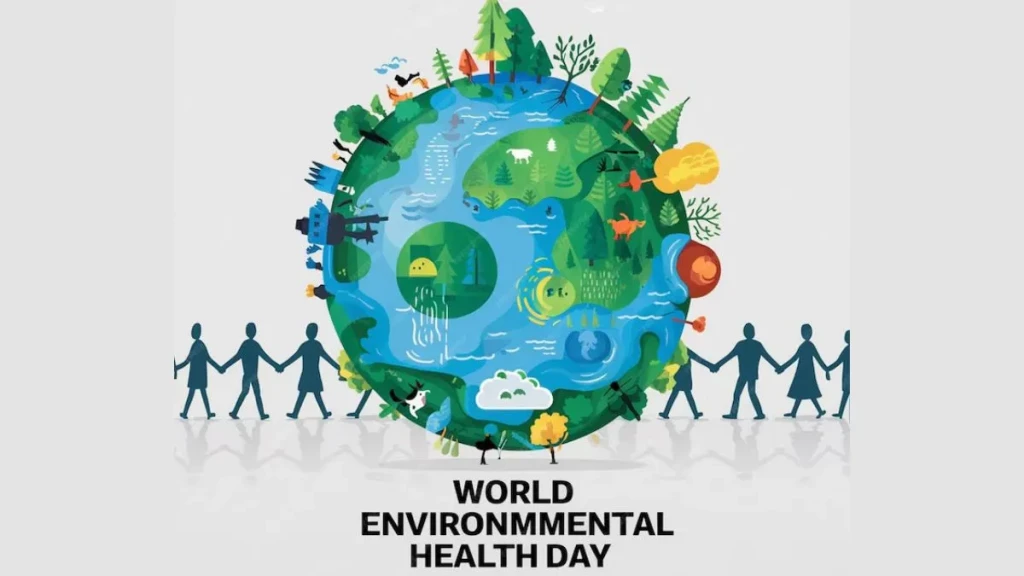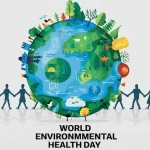World Environment Health Day 2024:
World Environmental Health Day 2024 is celebrated every year on September 26. This day emphasizes the importance of creating a safe and healthy environment, addressing key issues like clean air, water, sanitation, pollution control, and waste management. It reminds us that the health of our planet is deeply connected to our own well-being. Neglecting environmental protection poses risks not only to nature but also to our health.
Theme 2024:
ENVIRONMENTAL HEALTH: CREATING RESILIENT COMMUNITIES THROUGH DISASTER RISK REDUCTION AND CLIMATE CHANGE MITIGATION AND ADAPTATION.
This theme focuses on the intersection between environmental health, climate change and disaster risk management. It calls for the building of resilient communities by addressing the health risks posed by climate change and natural disasters.
The theme for this year is, "Environmental Health: Creating Resilient Communities Through Disaster Risk Reduction And Climate Change Mitigation And Adaptation." Climate Change and disaster risks are fundamental threats to the living and health conditions for all humans on the globe, and in poverty reduction, as well as threat to sustainable development.
World Environmental Health Day is annually observed for the following purposes:
- To raise awareness of the continuing threats to human health posed by pollution, climate change, industrialization, urbanization, globalization, and poor sanitation.
- To recognize the dedication and work of environmental health professionals and educators around the world.
- To promote improving the quality of the natural environment, air, water, food, housing, and communities.
Environmental health is really important for tackling climate change and making communities stronger and more sustainable. To build communities that can handle challenges, we need to think about both climate change and disaster risks together when planning and budgeting for the future.
Environmental health professionals work on many issues, like controlling disease outbreaks, managing air and water pollution, ensuring food safety, and dealing with waste. They play a key role in responding to climate change and disaster risks. As climate change continues to create serious problems, we need to strengthen our efforts to reduce its impact and adapt to new conditions.
When planning for disaster risk reduction, it’s crucial to fight climate change by reducing fossil fuel use and carbon emissions. We also need to understand that social and economic factors, like inequality and discrimination, make some people more vulnerable to disasters and climate change effects. This means we must rethink how we connect disaster planning, climate change, and development to create real change for a sustainable future.
Environmental health matters to everyone, but it’s especially important for vulnerable groups, like children, the elderly, and people with chronic illnesses. Exposure to environmental hazards can lead to serious health problems, such as respiratory infections, heart disease, and even cancer. A comprehensive approach is needed to address these issues before, during, and after disasters. Although efforts to reduce disaster and climate change risks have been around for a long time, we must keep linking them to protect the progress we’ve made.

History of World Environment Health Day:
World Environmental Health Day was launched by the Council of the International Federation of Environmental Health (IFEH), a nonprofit organization founded in 1986 and based in London, England. The IFEH aims to spread knowledge about environmental health and promote cooperation between countries to improve the environmental conditions on our planet.
The World Environmental Health Day is celebrated on September 26 across the globe. In fact, the biggest reason for our declining health is our neglect of nature. To keep our bodies healthy, it is essential to protect the environment. This day is observed to raise awareness and convey the importance of this issue. It was initiated by the International Federation of Environmental Health in 2011.
Our environment's state profoundly affects both physical and mental health. The World Health Organization (WHO) states that improving our environments could prevent nearly 25% of the global disease burden. Key practices for maintaining a healthy environment include ensuring clean air, stable climate patterns, access to safe drinking water, sanitation, hygiene, safe chemical use, sustainable agriculture, health-supportive urban areas, and the conservation of nature. All of these elements play a vital role in promoting public health.
Since we interact with our environment every day, its impact on our health is significant. Maintaining a healthy environment is essential to protect ourselves from various environmental hazards—physical, chemical, and biological—that can lead to illnesses like cancer, respiratory disorders, asthma, and allergies.









